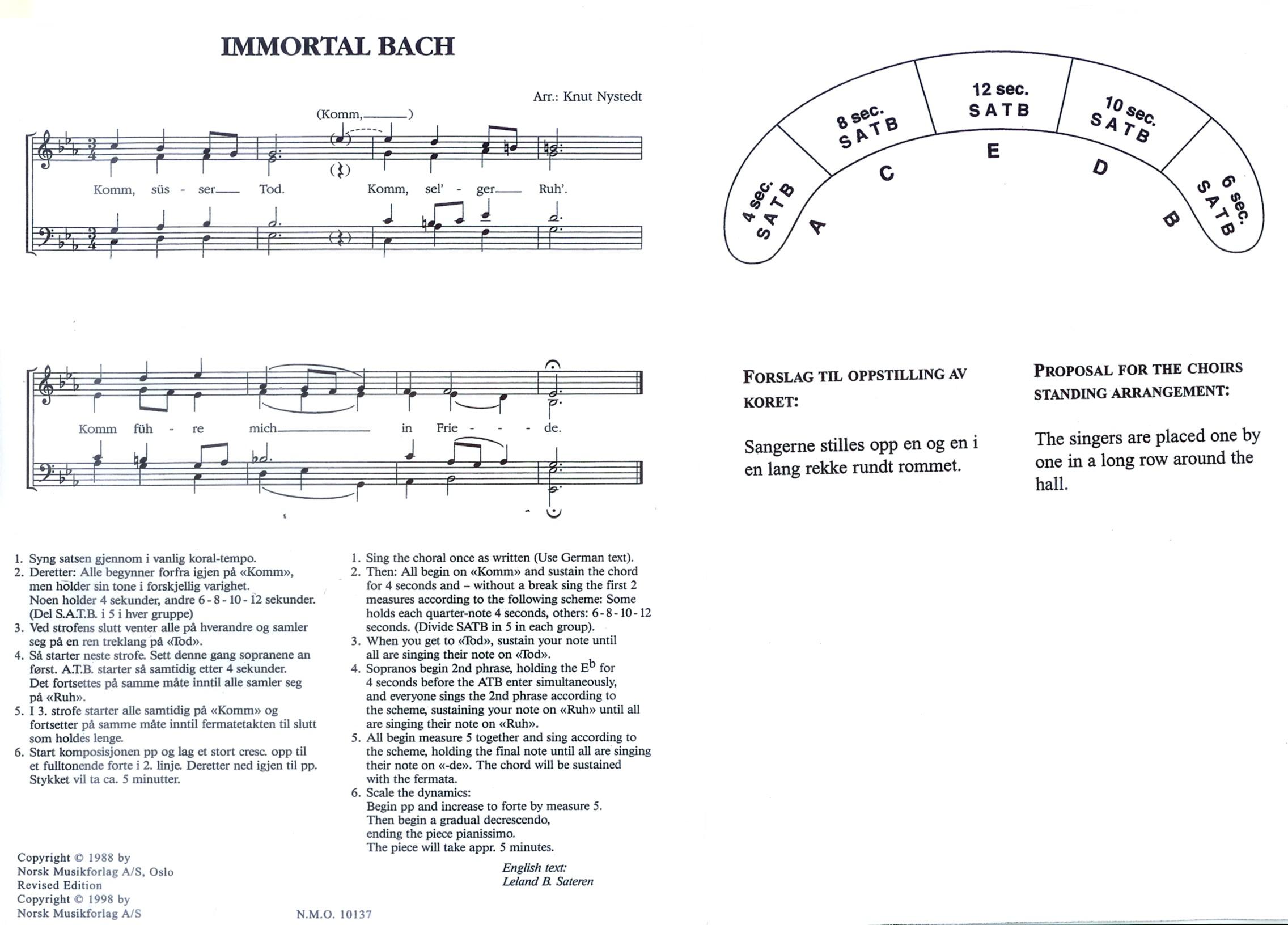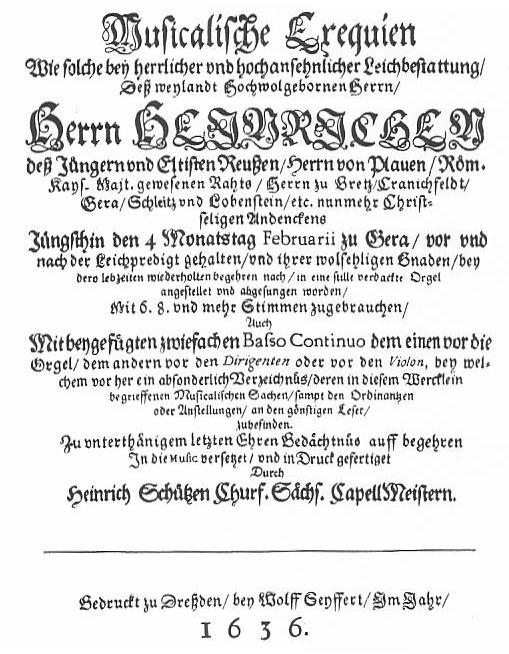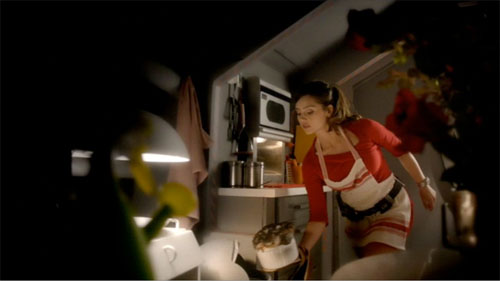Motets, as Bach defines them, are a slightly different genre than used before.
The “cantata,” a new genre, came to mean a multimovement work typically beginning with chorus, alternating arias and recit, and concluding with a chorale.
Motets are essentially cantatas consisting of all choral movements
No librettist, aside from the chorales, is credited – Bach selected the texts
Written approximately between 1723-29 at least some and possibly all for funerals
Things for which to listen in Bach:
Laughter/dancing
Sighing/weeping
Wandering/fleeing
Cross
Trinity
Rhythms and meters signifying biblical numbers
Soloists and instrumentalists themselves text-painting
Doctrine of affections
Singet dem Herrn ein neues Lied (BWV 225)
Sing to the Lord a new song
1. Singet dem Herrn (Psalm 149:1-3)
2. “Nun lob, mein Seel, den Herren” v. 3
3. Lobet den Herrn (Psalm 150:2-6)
Two choirs toss back shouts of “Singet!” and playful figures in 3/8 to illustrate the joy of the Christian, additionally text-painting on the words “Harfen,” “Pauken,” and “Reichen,” making use of the “laughing” style. The second movement, an aria alternating with a chorale movement, blends the two with supplementary texts and similar melodic shapes. Lastly, “Lobet den Herrn” returns to the effervescent style of the first movement, rolling back and forth in 3/8 between choirs until combining all to sing “Praise the Lord!” at the end.
Der Geist hilft unser Schwachheit auf (BWV 226) The Spirit helps in our weakness
1. Der Geist hilft unser Schwachheit auf (Romans 8:26)
2. Der aber die Herzen forchet (Romans 8:27)
3. “Komm, Heiliger Geist” v. 3
Composed in a rush in October of 1729, this cheerful motet was sung for a funeral for the rector Johann Ernesti, or adapted from a now-lost cantata. Rocketing off in the bright key of B-flat Major, the laughing groups of spiritlike 16th-note figures surround the listener in polychoral comfort that “The Spirit helps in our weakness.” Bach must have written the verse from memory, for the word “selbst” seems to have an extra syllable. Secondly, the words “He who examines hearts…” are set to a canon, hinting at the fact that He is measuring something according to the Law. Finishing this lively fugue is the third verse of “Come, Holy Ghost, God and Lord,” praying for the Comforter to come and strengthen the hearts of all believers.
Jesu, meine Freude (BWV 227)
Jesus, my joy
1. “Jesu, meine Freude” v. 1, 4
2. Es ist nun nichts Verdammliches (Romans 8:1)
3. “Jesu, meine Freude” v. 2
4. Denn das Gesetz (Romans 8:3)
5. “Jesu, meine Freude” v. 3
6. Ihr aber seid nicht fleischlich (Romans 8:9)
7. “Jesu, meine Freude” v. 4
8. So aber Christus in euch ist (Romans 8:10)
9. “Jesu, meine Freude” v. 5
10. So nun der Geist (Romans 8:11)
11. “Jesu, meine Freude” v. 5
This simple pairing of verses from Paul Gerhardt’s hymn with passages of Romans 8 shows Bach’s theological mastery as well as text-painting skills. Each verse of the chorale is set to fit the text: “Now there is nothing, nothing” is set quite emphaticallythe third verse, on the word “trotz,” meaning “defiance,” is spit out with anger, hinting at the cantus firmus in the shape of the melody. “Tobe,” the word for rage, is painted with an aggressive run in the tenor and bass. “You are not in the flesh, but in the spirit,” has a very long melisma on the latter. The fifth verse “Good night,” sighs as the walking continuo marches away from the world’s temptations. Romans 8:10 then adds how the believer will be raised again from the
dead, with the “spirit” figure at the close coming to rest. Lastly, the final verse looks to Jesus’ entrance as the Master of joy in a glorious four-part setting identical to the first.
Furchte dich nicht (BWV 228)
Do not fear
1. Furchte dich nicht (Isaiah 41:10)
2. Furchte dich nicht, denn ich habe (Isaiah 43:1)
3. “Wann ich gramen” v. 4 and 5
Some consider this to be the most difficult of Bach’s motets. In the opening figure, the choir is scattered everywhere, almost as if they doubt the plea “Do not fear.” “I will strengthen you” is the next motif, supported by fully-diminished seventh chords. The extent of repetition emphasizes how much the listener needs it.
In the third movement, a descending chromatic subject penetrates all voices parts underneath the soprano cantus firmus. To close, all exclaim “Do not fear” several times, ending in homophonic motion: “you are Mine!”
Komm, Jesu, komm (BWV 229)
Come, Jesus, come
1. Komm, Jesu, komm
2. Drum schliess ich mich in deine Hande
With a cry of urgency, each side of the choir calls out “Come!” with a slow pace to suggest “my body is weary.” Painting “waning strength,” they start out the next phrase with vigor but then die away in tempo. Thinking about peace, they cadence at a major chord before going on to the “sour path,” then “yielding” in rest to Jesus at the end. This motet’s following aria prays that the Lord will come quickly, singing the world a farewell, and commiting quietly to Jesus at the end.
Lobet den Herrn alle Heiden (BWV 230) Praise the Lord, all ye nations
1. Lobet den Herrn alle Heiden (Psalm 117)
The opening triadic shape of the text, Psalm 117 exudes a festive, confident air, imitating trumpets and timpani with the layering and melismas of voices. Describing God’s “grace and truth,” the style slows and becomes homophonic, regaining speed and polyphonic texture to paint His rule for eternity, and a joyous Alleluia in a waltz-like triple meter.
Works Cited:
Emmanuel Bach Choir. “Motets and Liturgical Works Notes and Translations.” Emmanuel Bach Choir. Web accessed 26 June 2014. http://emmanuelmusic.org/ notes_translations/nt_notes_transl_motet.htm#pab1_7
Geck, Martin. Johann Sebastian Bach: Life and Work. Orlando: Harcourt Publishing, 2000.
Shrock, Dennis. Choral Repertoire. London: Oxford University Press, 2009.
Stapert, Calvin R. My Only Comfort: Death, Deliverance, and Discipleship in the Music of Bach. Grand Rapids, MI: Eerdmans Publishing Company, 2000.











































